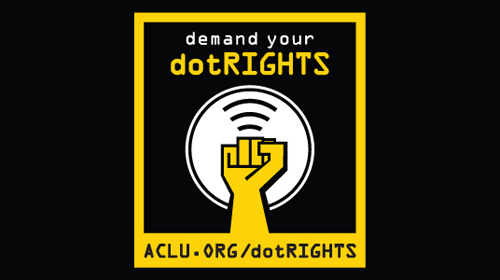
In the digital age that we live in today, we are constantly exposing our personal information online. From using cell phones and GPS devices to online shopping and sending e-mail, the things we do and say online leave behind ever-growing trails of personal information. The └¤░─├┼┐¬¢▒¢ß╣¹ believes that Americans shouldnÔÇÖt have to choose between using new technology and keeping control of your private information. Each week, we feature some of the most interesting news related to technology and civil liberties that weÔÇÖve spotted from the previous week.
[Wired]
"The House on Thursday approved cybersecurity legislation that privacy groups have decried as a threat to civil liberties Its goal is a , but privacy groups fear the measure breaches Americans' privacy along the way."
See Also Keep Domestic Cybersecurity Efforts in Civilian Hands [└¤░─├┼┐¬¢▒¢ß╣¹]
See Also [Techdirt]
See Also [Read Write Web]
See Also [Reason]
[Wired]
"Cellphone companies are objecting to proposed California legislation that would force them to publicly report the number of times they turn over cellphone location information to police and federal agents, arguing that it's too burdensome, and would take time away from the important work of sharing customer data with cops 'day and night.'"
See Also [└¤░─├┼┐¬¢▒¢ß╣¹ of Northern California]
See Also [Techdirt]
[USA Today]
"Google is already facing spasms of suspicion and confusion as it tries to persuade people to entrust their personal documents, photos and other digital content to the company's new online storage service."
See Also [CNET]
See Also [CNET]
See Also [Read Write Web]
Need For a Warrant For GPS Tracking Still Not Settled [└¤░─├┼┐¬¢▒¢ß╣¹]
Last night we filed an amicus brief in United States v. Pineda-Moreno, a Ninth Circuit case that could play a significant role in determining how broadly the Supreme Court's recent GPS tracking decision, United States v. Jones, is applied to protect Americans' privacy.
All Dressed Up And Nothing to do Except Arrest Photographers [└¤░─├┼┐¬¢▒¢ß╣¹]
Police around the country continue to individuals' right to photography. A photographer named Carlos Miller maintains a web site in which he . Now, Miller himself has about his own arrest for photography, which took place during the eviction of Miami Occupy protesters in January. Using an open-records request, he found that officials at the Miami-Dade Police Homeland Security Bureau, Fusion Center, had exchanged numerous e-mails over a period of months, in which they discuss their monitoring of Miller and his activities.
Learn more about dotRights: Sign up for breaking news alerts, , and .

